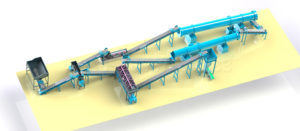Raw material for bio-organic fertilizer production
The main raw materials for bio-organic fertilizer production are agricultural wastes such as livestock and poultry manure and crop straws.

Mixed ingredients in bio-organic fertilizer production
The source of raw materials, fermentation method and equipment are different, and the ingredients are also different. The specific formula depends on the source of the organic material. The general principle of ingredients is: the organic matter content of the total material should be greater than 30% (preferably 50%-70%), carbon to nitrogen ratio (15:1)-(20:1), pH value should be 6-7.5, including The water content should be around 50%, and the water content should be adjusted to 50%-70% during inoculation.
Fermentation maturity
It can be laid flat or fermented in a fermenter. Fermentation tanks are usually placed in closed or semi-closed fermentation chambers. The effect is better than flat ground. Every three days, you need to use a fertilizer turning machine to turn it regularly. After 25-30 days of fermentation, the temperature is gradually reduced from 70-80°C to stable, and the decomposition is completed.
Bio-organic fertilizer production equipment and process
Crushing and mixing pretreatment
Crushing equipment: semi-wet material crusher
This machine is mainly used for crushing biofermented organic fertilizer materials with 25% to 50% moisture. The crushing particle size meets the granulation requirements, and can also be adjusted within a certain range according to user needs. It has a good effect on crushing hard materials such as glass bricks, ceramics and crushed stones in organic fertilizer for municipal solid waste.
Mixing equipment: horizontal mixer
The mixer is mainly used for batch mixing of raw materials, and the materials can be fully stirred. The mixing rate is high and the residue is less. It is suitable for the mixing of feed, concentrated feed and premix additives.
Bio-organic fertilizer production process
Granulation equipment
After composting, the material needs to be granulated to have a certain strength and shape before it can be used as an organic fertilizer. Granulation is a key step in the production of bio-organic fertilizer. There are many types of bio-organic fertilizer granulators. According to the structure of the granulator, the aggregate method can be divided into disc granulator, drum granulator, and new organic fertilizer granulator. According to the position of the press roll, the extrusion method can be divided into a double roll press granulator, a flat die granulator and a ring die granulator.
Disc granulator for bio-granular fertilizer production: Disc granulators are widely used, producing less coarse particles, and the granulation rate is greater than 90%, but the powder fineness requirements are higher.
Drum granulator machine: suitable for mass production of cold and hot granulation and high, medium and low concentration compound fertilizers.
New organic fertilizer granulator: used for granulating organic matter after fermentation, it is the latest technology product with many years of research experience.
Double-roller press granulator: The machine has two shafts, one shaft is fixed and the other shaft is movable. The distance between the two shafts can be adjusted. The shaft material will be extruded between the shafts. The material is granulated at room temperature, no drying process is needed, which saves energy and reduces consumption.
Flat die granulator: There is no need to dry and crush raw materials before granulation. It can directly dispense cylindrical particles and save a lot of energy.
More details of different types of granulators, welcome to https://fertilizergranulatorfactory.com/
Screening equipment
Drum screening machine: There is a certain difference in the particle size output by the granulation molding system, which requires screening and classification. The drum screening machine has the advantages of low vibration, low noise, and convenient screen change. The production line is equipped with an automatic feedback system, which screens the unqualified large and small particles, conveys them through a belt hoist, and then crushes them and sends them to the granulator to continue granulation, which is conducive to improving the continuous operation capacity of the production line.
Vibration screening machine: It has better screening effect on materials, but it has more dust than drum screening machine when working.
